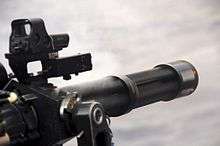Active Royal Navy weapon systems
 |
| Her Majesty's Naval Service of the British Armed Forces |
|---|
| Components |
|
|
| History and future |
|
|
| Ships |
| Personnel |
| Auxiliary services |
This is a list of Active Royal Navy weapon systems.
Guns
4.5" Mark 8 naval gun
The 4.5" main gun can be found on all the Royal Navy's frigates and destroyers and was used in the Falklands and Iraq. The gun can fire up to 24 high explosive shells per minute, each weighing more than 40 kg, at targets more than 12 miles away - this can be extended to nearly 18 miles if special extended-range shells are used.
There are two types of the gun used by the Royal Navy. The older Mod 0 (with a curved turret), which is being replaced, and the angular Mod 1 which is harder for enemy radar to pick up. The main purpose of the gun is Naval Gunfire Support – artillery bombardment of shore targets. In this role the gun is capable of firing the equivalent of a six-gun shore battery. It can still be used as an anti-ship weapon.[1]
30mm DS30M Mark 2 naval gun
The 30mm DS30M Mark 2 is a 30 mm automated naval gun system designed to defend ships from fast inshore attack craft armed with short-range weaponry. The DS30M Mark 2 system consists of a 30mm Mark 44 Bushmaster II cannon on a fully automated mount with an off-mount electro-optical director (EOD).
Miniguns

All Royal Navy ships carry minigun for close in defence.[2][3]
General Purpose Machine Gun (GPMG)
The GPMG's are used for close in defence.[2][3]
Close-in Weapon Systems (CIWS)
Phalanx
The Phalanx Close-in Weapon System is an anti-ship missile defence system. It is fitted to the Type 45 destroyers as well as the Bay class landing ships and Wave and Fort Victoria class replenishment oilers in the RFA. It is also currently in the designs for the new Type 26 Frigates. During Operation Telic, Phalanx guns were removed from ships and were crewed by RN personal based at Basra airport, as part of the Centurion C-RAM system.[4]
Goalkeeper
The Goalkeeper Close-in Weapon System is fitted to the Albion class ships HMS Albion and HMS Bulwark. It can track up to 15 targets at the same time, then, depending on which ones are the most dangerous it can engage them at ranges up to 1,500 metres.[5] It is expected that the Goalkeeper will be replaced in its capacity aboard the Albion class ships by the Phalanx as Goalkeeper will be removed from service in 2015.
Torpedoes
Spearfish torpedo
The Spearfish torpedo is the Royal Navy's heavyweight torpedo, weighing nearly two tonnes, which is carried by both the SSN and SSBN submarines. It has a range of more than 30 miles with a speed in excess of 92 mph and can be used in either against other submarines or ships of any size. It carries a 300 kg explosive charge and is guided either by its in-built sonar or via a copper-cadmium wire.[6]
The Spearfish is currently undergoing a major upgrade program which will provide sophisticated advances in its homing, warheads, tactical and fueling systems, as well an upgraded guidance link.[7]
Sting Ray torpedo
The Sting Ray torpedo is the Royal Navy's lightweight torpedo which is designed to be carried by the anti-submarine helicopters AgustaWestland Merlin and Lynx Wildcat. It has a range of around 5 miles with a speed of more than 52 mph and is designed to be used predominantly against submarines. It carries a 45 kg explosive charge which is powerful enough to punch through the double hulls of modern submarines.[8] It is also integrated on-board the Type 23 Frigates, deployed by two twin torpedo launchers.
Mine Disposal System
Seafox
The Seafox Mine Disposal System is an unmanned underwater vehicle (UUV) used by both the Sandown and Hunt class mine hunters. The unit incorporates a remotely controlled surveillance system in order to identify a target, guided from the parent ship via fibre optic cables. Once a mine has been identified, an expendable autonomous or remote guided unit is guided to the target and detonates a shaped charge to destroy the mine. Four independent reversible motors and a hover thruster provide high manoeuvrability, allowing for exact placement prior to charge detonation. The Seafox is highly capable unit that seen action with the Royal Navy in recent conflicts clearing coastal waters in both Iraq and Libya.
Anti-Aircraft and Anti-Missile Missiles
Seawolf
The Seawolf is an anti-aircraft and anti-missile weapon equipping the Type 23 frigate fleet. It has been in service for more than three decades and has seen action in the Falklands War. It is sometimes described as a Point Defence Missile System because, unlike Sea Viper and Sea Dart, Seawolf is intended to defend an individual ship rather than a fleet, engaging aircraft or sea-skimming missiles. It is fired from a silo on Type 23 frigates, and guided on to its target by a dedicated tracking system on the ship. The fleet is in the middle of receiving the latest version of the missile system.[9] On board the Type 23 frigates the missile is launched from a 32 cell, vertical launch system. Seawolf will be replaced by CAMM (M) between 2015 and 2021.
Sea Viper
The Sea Viper is the main weapon of the Type 45 destroyers and provides all-round defence for an entire naval task group against all aerial threats at some 70 miles away. It races towards its target at speeds in excess of Mach Four (over 3,000 mph) using a series of tiny jets to manoeuvre, carrying out sharp turns.
The Principle Anti-Air Missile System on the Type 45 destroyers, of which Sea Viper is a principal component, comprises the SAMPSON radar, a Combat Management System, S1850M long-range radar, the Sylver vertical launching system and Aster 15 (20 miles) and Aster 30 (75 miles) missiles.[10]
Anti-ship missiles
Harpoon

The Harpoon is fitted to all Type 23 frigates and is scheduled to be fitted to four Type 45 destroyers in a 2×4 canister configuration, the other two being "fitted for but not with". It is an anti-ship missile capable of striking at targets more than 80 miles away and is also in use with many other NATO countries' navies.[11]
Sea Skua
The Sea Skua is a lightweight short-range air-to-surface missile designed for use from helicopters against ships. It is used by the Fleet Air Arm on the Westland Lynx. It is due to be replaced by the FASGW(H) missile, which is a collaboration between the British and French governments.
Land Attack Missiles
_(TLAM)_flying_through_the_air._12-04-2000_MOD_45138116.jpg)
Tomahawk missile
The Tomahawk missile, also known as TLAM (Tomahawk Land Attack Cruise Missile), allows the Navy’s submarines to strike at targets on land accurately. The missile has been in use with the RN since the late 1990s and has been used in the Kosovo conflict and in the campaigns against the Taliban and Saddam Hussein. It is fired from a boat's torpedo tubes. Once it reaches the surface, a booster rocket ignites to propel the missile skywards. Tomahawk then heads for its target at 550 mph, delivering a 1,000 lb explosive warhead.
The Tomahawk IV is the latest version of the missile. It has a longer range than its predecessors and can be directed at a new target in-flight, and can also beam back images of the battlefield in British service it is fitted to all Trafalgar and Astute class submarines.[12] It is currently planned to be phased out of service in the American Navy with no more weapons to be produced after 2015 meaning that it may no longer be an option for the Royal Navy from around the end of the decade.[13]
Trident D5 ballistic missile
The Trident nuclear missile is Britain's nuclear deterrent. Carried only by the 4 Vanguard-class submarines, it is ejected from their silos by high-pressure gas before the rockets fire when the missile reaches the surface. At its fastest, the missile travels at over 13,000 mph. Each Vanguard boat has 16 missile tubes, and each missile has the ability to deliver 8 warheads every warhead is about eight times more powerful than the nuclear bomb used at Hiroshima in World War II [14]
See also
References
- ↑ Royal Navy 4.5" Mark 8 naval gun (archive), royalnavy.mod.uk, Retrieved 11 June 2014
- 1 2 Royal Navy Gunnery (archive), royalnavy.mod.uk, Retrieved 11 June 2014
- 1 2 "HMS Daring's Warfare Department". Royal Navy website. Retrieved 2010-06-08.
- ↑ Royal Navy Phalanx (archive), royalnavy.mod.uk, Retrieved 11 June 2014
- ↑ Royal Navy Goalkeeper (archive), royalnavy.mod.uk, Retrieved 11 June 2014
- ↑ Royal Navy Spearfish Torpedo (archive), royalnavy.mod.uk, Retrieved 11 June 2014
- ↑ BAE Systems Spearfish torpedo, baesystems.com
- ↑ Royal Navy Sting Ray torpedo (archive), royalnavy.mod.uk, Retrieved 11 June 2014
- ↑ Royal Navy Sea Wolf (archive), royalnavy.mod.uk, Retrieved 11 June 2014
- ↑ Royal Navy Sea Viper (archive), royalnavy.mod.uk, Retrieved 11 June 2014
- ↑ Royal Navy Harpoon (archive), royalnavy.mod.uk, Retrieved 11 June 2014
- ↑ Royal Navy Tomahawk missile (archive), royalnavy.mod.uk, Retrieved 11 June 2014
- ↑ Tomahawk Cancellation an Error of Defense Strategy and Alliance Policy, heritage.org, 2 April 2014
- ↑ Royal Navy Trident (archive), royalnavy.mod.uk, Retrieved 11 June 2014
External links
- Royal Navy (royalnavy.mod.uk)
- Royal Navy — The Equipment — Ships (royalnavy.mod.uk)